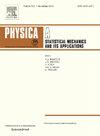Dynamic strategy update mechanisms facilitate cooperation
IF 3.1
3区 物理与天体物理
Q2 PHYSICS, MULTIDISCIPLINARY
Physica A: Statistical Mechanics and its Applications
Pub Date : 2025-09-28
DOI:10.1016/j.physa.2025.131016
引用次数: 0
Abstract
In offshore aquaculture, fishermen determine their farming methods based on either their own and their neighbors' previous payoff information or their personal historical payoff data. The available farming methods include environmentally friendly practices and environmentally damaging practices. Typically, they decide which information to use for updating their farming strategies based on whether their current payoff meets a satisfactory value. This study employs a social dilemma game model to investigate this issue, where the two farming methods correspond to cooperative and defecting strategies, respectively. The utilization of payoff information reflects different strategy update mechanisms, and it is assumed that individuals decide whether to retain or switch their update mechanisms based on whether their payoff meets the satisfaction value. The results indicate that dynamic changes in strategy update mechanisms can effectively promote cooperation, favoring the adoption of environmentally friendly farming practices. Moreover, when the satisfaction value is either relatively low or high, more individuals tend to adopt such sustainable farming methods.
动态战略更新机制促进合作
在近海水产养殖中,渔民根据自己和邻居以前的收益信息或他们个人的历史收益数据来确定他们的养殖方法。现有的耕作方法包括环境友好的做法和破坏环境的做法。通常,他们根据当前的收益是否达到令人满意的值来决定使用哪些信息来更新他们的耕作策略。本研究采用社会困境博弈模型来研究这一问题,其中两种耕作方式分别对应于合作策略和背叛策略。支付信息的利用反映了不同的策略更新机制,假设个体根据其支付是否满足满意值来决定是否保留或转换更新机制。结果表明,战略更新机制的动态变化能够有效促进合作,有利于采用环境友好的耕作方式。此外,当满意度值相对较低或较高时,更多的个体倾向于采用这种可持续的耕作方式。
本文章由计算机程序翻译,如有差异,请以英文原文为准。
求助全文
约1分钟内获得全文
求助全文
来源期刊
CiteScore
7.20
自引率
9.10%
发文量
852
审稿时长
6.6 months
期刊介绍:
Physica A: Statistical Mechanics and its Applications
Recognized by the European Physical Society
Physica A publishes research in the field of statistical mechanics and its applications.
Statistical mechanics sets out to explain the behaviour of macroscopic systems by studying the statistical properties of their microscopic constituents.
Applications of the techniques of statistical mechanics are widespread, and include: applications to physical systems such as solids, liquids and gases; applications to chemical and biological systems (colloids, interfaces, complex fluids, polymers and biopolymers, cell physics); and other interdisciplinary applications to for instance biological, economical and sociological systems.

 求助内容:
求助内容: 应助结果提醒方式:
应助结果提醒方式:


